Magazine
2G: A Case Of Poor Judgement
Arihant Pawariya
Aug 01, 2018, 02:14 PM | Updated 02:14 PM IST
Save & read from anywhere!
Bookmark stories for easy access on any device or the Swarajya app.
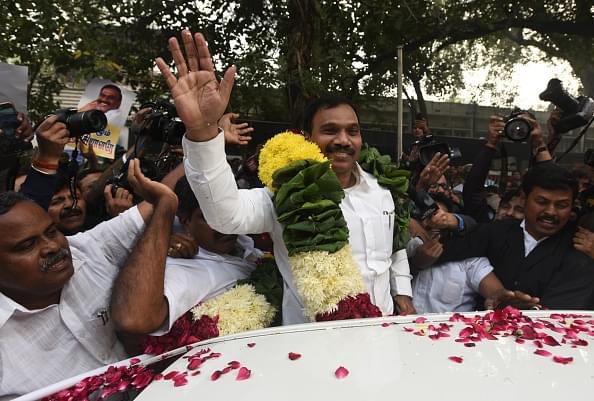
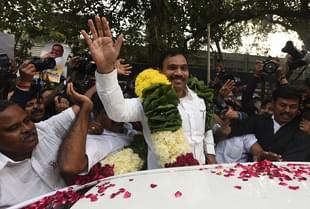
On 21 December 2017, a special Central Bureau of Investigation (CBI) court pronounced its verdict in the 2G spectrum allocation scam case. The court gave a clean chit to all the accused when, in fact, the country was expecting the opposite. It came as a rude shock to the people that those, who had in their eyes committed the biggest financial fraud in the short history of the republic, went scot-free.
It’s a fact that the spectrum licences were allotted in an arbitrary and capricious manner. The Supreme Court of India cancelling the licences and ordering the government to take the auction route is testament to this.
It is also a fact that in 2008, under A Raja, the Department of Telecom (DoT) followed the outdated 2001 policy, going against the advice of the then Prime Minister, the Finance Minister and the Law Minister.
It is also a fact that DoT tweaked rules multiple times in an ad-hoc manner that favoured certain new players, who came into existence in a very questionable manner, and who sold off stakes after getting the licences, at a huge premia even though spectrum was the only asset they held at that time.
It is also a fact that the bosses of these firms were business associates of some members of Raja’s family and his private secretary in the DoT.
It is a fact too, that sister firms of the new telecom players that got the licences wired over Rs 200 crore to a channel owned by the daughter of A Raja’s political boss and former Tamil Nadu chief minister M Karunanidhi.
Then, how did everyone get acquitted in the face of such strong circumstantial evidence? There are mainly two reasons: first is the poor judgement by the CBI court; and second is the not so great work done by the prosecution. But, despite all the unpreparedness of the latter, the judgement would’ve certainly been ‘guilty’ if one had merely followed the logic of the Supreme Court's earlier verdict in the matter.
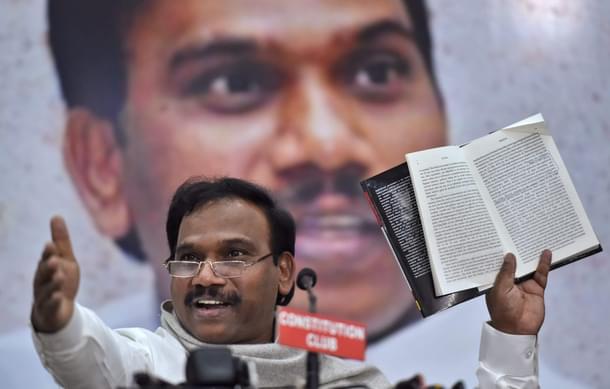
The Crime
The central issue in the case was the loss of potential revenue to the exchequer due to policies adopted by the DoT which were changed in an arbitrary and non-transparent manner that ended up favouring a select few. One needn’t take the loss figure of Rs 1.76 lakh crore at face value. It could be way less. But the fraud happened. That much is clear from the success of the re-auctioning of cancelled licences in 2014.
Why did the fraud happen in the first place? Because the auction route wasn’t taken. Why wasn’t it taken despite the then prime minister and the then finance minister exhorting Raja to do so? Because Raja didn’t want it.
Instead of focusing on how this policy decision benefited a select few, who in turn, deposited money in the bank account of friends of the one who facilitated the whole scheme, suggestive of an indirect quid pro quo. The court discussed at great length how meticulously Raja stuck to the old policy no matter its relevance or ramifications.
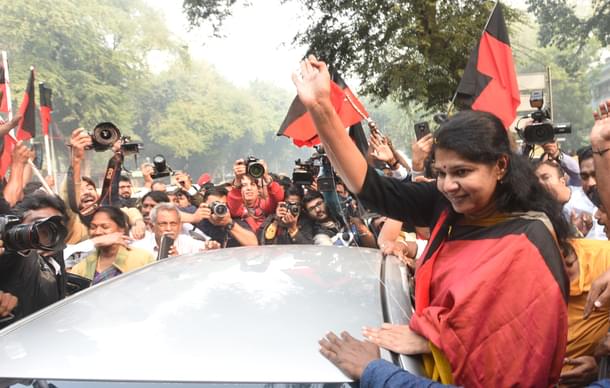
The Smoking Guns
What were Raja’s reasons for adopting policies that benefited the accused businessmen?
First, the prosecution alleged that the owners of DB Realty, Shahid Balwa and Vinod Goenka, and the owner of Unitech Limited, Sanjay Chandra, were familiar with Raja since when he was the environment minister and used to meet them often at his home and office in connection with clearing their real estate projects, to which Raja obliged.
But the prosecution couldn’t prove any familiarity between Raja and Balwa, Chandra and Goenka. Aseervatham Achary, Raja’s aide in different ministries, in different roles, from 1999 to 2008, told the court that, “I saw Shahid Balwa and Vinod Goenka approximately more than 20 times, in the office of the minister of environment and forests”. When Raja was asked whether he met them, he didn’t refuse outright and said, “I do not recollect specifically...”. The judge rejected the charge as the prosecution could not collect even a single appointment chart or the visitors' register in which the meeting of the three accused (Balwa, Goenka and Chandra) with the minister could be traced. Fair enough. But wait for it.
The prosecution proved that DB Realty, through Protiviti Consulting (P) Limited, got due diligence conducted for Green House Promoters (P) Limited, a company promoted by Raja’s aide Sadhick Batcha and which had members of Raja’s family as its directors. Also, DB Realty, through its subsidiary Eterna Developers (P) Limited, paid Rs 1.25 crore to Green House Promoters (P) Limited as an advance for purchase of land, but the money was returned later. All of this show that Raja was familiar with DB Group of Shahid Balwa and Vinod Goenka much before.
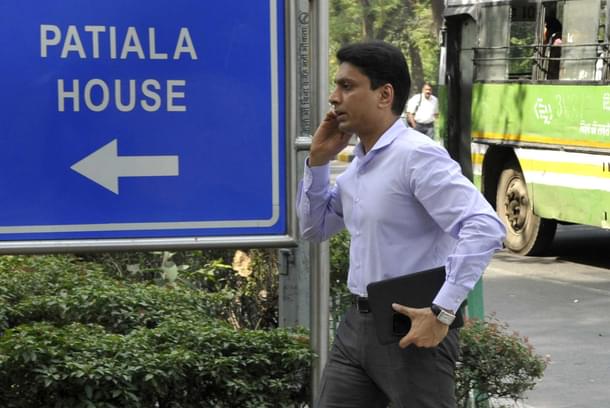
However, judge O P Saini ruled that “being former director of a company does not show their familiarity with Sh. A. Raja”. Regarding the Rs 1.25 crore transaction from DB Realty to Green House Promoters (P) Limited (where Raja’s relative was a director), the judge said it doesn’t prove anything and, at best, “shows an inchoate (doing something in preparation of a criminal act) transaction between the two companies”! The judge then goes further and states that “mere familiarity does not mean conspiratorial familiarity”. So, when the prosecution wasn’t able to establish familiarity, Saini took them to task for not producing any solid document, but when it established familiarity, the judge ruled that it didn’t mean conspiratorial familiarity.
Here is another smoking gun: the prosecution proved that not only the accused businessmen were familiar with Raja but also with his private secretary R K Chandolia, who had leased out his house at C6/39, 2nd Floor, Safdarjung Development Area, New Delhi, to Associated Hotels Private Limited, a sister concern of DB Realty Limited – the same company whose telecom arm Swan Telecom got a 2G spectrum licence.
The second reason and more clinching one is obviously the quid pro quo. DB Realty transferred Rs 200 crore to Kalaignar TV (in which Kanimozhi, daughter of Raja’s boss, has a 20 per cent stake), which the prosecution said was gratification in exchange for granting telecom licences to Swan Telecom, promoted by Balwa and Goenka, which establishes the quid pro quo. But Judge Saini said there was no evidence in the deposition of these witnesses of any conspiracy to transfer the amount of Rs 200 crore. Wait! So, the transfer is not in dispute, but the judge said it doesn’t prove any conspiracy.
Essentially, Raja allotted spectrum to new players, who were in business with a company, where Raja’s relative was a director. And these new players also transferred Rs 200 crore to a TV channel owned by the family of Raja’s party supremo at the same time as and when Raja allotted licences to these new players. What a coincidence!
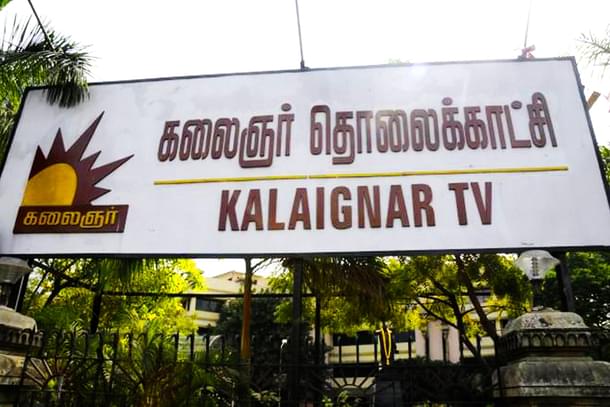
Shifting Blame
The court didn’t hold Raja responsible for all the arbitrary decisions that were taken under his watch which benefited the accused companies. The process of award of licences adopted by the DoT was a continuous one based on priority and fixed on the basis of date of receipt of applications. There was no provision of a cut-off date. It was announced nonetheless on 24 September 2007, and fixed as 10 October 2007, giving a window of 15 days to submit all applications. The note bears signature of A K Srivastava, the then deputy director general (access service) in DoT. Srivastava told the court that he was asked by Chandolia to stop receipt of applications on that day itself (24 September) after Unitech’s application was received. But Srivastava instead put 10 October in his proposal.
The judge ruled that since the proposal officially originated from Srivastava, “this note would be attributed to Sh. A. K. Srivastava and to none else.” Fair enough. But again, wait for it.
The real issue is not announcing the cut-off date but that it was first brought forward to 1 October and most importantly changed to 25 September retrospectively in October – exactly what Chandolia wanted. Where did all this originate from? None other than Raja. Three drafts prepared and approved by four senior officers in the telecom department – Nitin Jain, Srivastava, Sridhara and D S Mathur – called for seeking the opinion of the solicitor general. But when the file came from the minister, it was a modified draft, which had fixed 25 September as the cut-off date. Raja denied in his deposition that he suggested the date. The judge ruled that since it was discussed in the ministry, it may be considered as a proposal by the department.
It is interesting that when a proposal originates from an official in the ministry, it is considered as a proposal of that individual, but when Raja initiates the proposal, it is seen as a proposal of the department.
The perversion of the process didn’t stop here. The DoT not only changed the cut-off date but also the ‘first come, first served’ procedure. Instead of processing applications on the basis of who applied first, it changed norms and decided to issue spectrum to players, who conformed to the terms of letters of intent (LOIs) first, ie, including but not limited to paying the fees. If this was the criterion to be followed, what was the need to announce the September cut-off date? Anyone from the pool of 575 applicants, who would submit the fees and comply with LOIs first could have been given the spectrum. But instead, the applicants were whittled down to 232, first by an arbitrary cut-off date and then by the change in the ‘first come, first served’ norm.
The judge in his order writes that this was done after discussions within the department and as suggested by the officers of the telecom department, and ultimately conveyed to the prime minister.
It appears that the ministry was run by officials, who were making all the decisions, conveniently benefiting some companies, which were close to Raja, who in turn just happened to affix his signature to whatever was suggested to him. He was just an innocent bystander, is the suggestion. And all the while, these same officials insisted that the minister came up with the cut-off date of 25 September, not them.
The Big Lie
To implement their distorted ‘first come, first served’ policy, R K Chandolia devised the method of four counters for the distribution of LOIs. This method resulted in a disorderly manner of priority allocation. Instead of those who applied first, priority was given to those who could comply first with criteria which were changed arbitrarily. When this method was implemented, different companies had differences of minutes, even seconds, in compliance and this ended up benefiting the accused Swan Telecom and Unitech.
Srivastava told the court that if the ‘first come, first served basis’ policy was followed, only one counter was sufficient to issue the LOIs/responses, wherein the process would be based on date of receipt of applications in DoT. However, the court held Srivastava responsible for coming up with the new method. Srivastava said he was following Chandolia’s orders. He told the court that, on 10 January 2008, when he and his fellow officers were discussing how to go about distributing LOIs, Chandolia came to his office and conveyed to him that LOIs had to be issued on that day itself as desired by Raja, and also suggested to go about it by opening four counters to which they disagreed.
Chandolia said he never went to Srivastava’s office. Five officers – Nitin Jain, Madan Chaurasia, Sukhbir Singh, A S Verma and N M Manickam – were in Srivastava’s room when Chandolia paid a visit. And all told the court that Chandolia had indeed come to meet Srivastava that day.
It’s clear that Chandolia misled the court with a straight face. On this, Judge Saini said that none of the officers knew exactly what Chandolia and Srivastava talked about. But the accounts of five people reveal one thing – they were deliberating on how to go about the issuance of LOIs but after Chandolia's visit, they had to issue LOIs on that day itself and that too through the method of four counters.
Ignoring all this evidence, the judge went with the official record: four officers in AS division came up with the ‘four counter’ method because their signatures are on the document. The truth is they had no incentive to be in such a hurry to resolve LOIs on that day itself. They were just going about processing LOIs at normal speed. It was only after Chandolia came with marching orders that the department hastened the process, moving at lightning speed, issuing a press release, calling all applicants, inviting them to the ministry, and issuing LOIs through four counters – all in a matter of six hours!
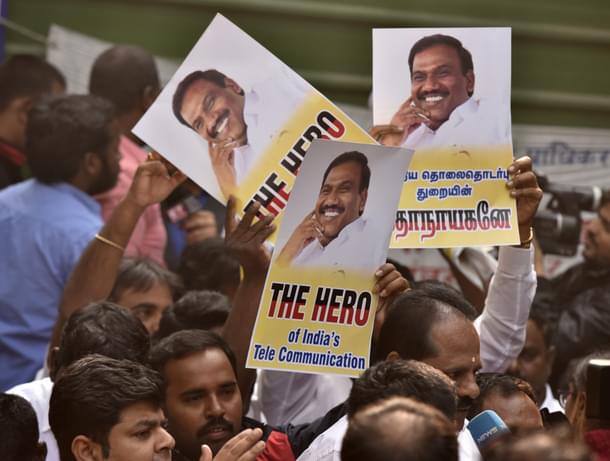
Back To The Main Issue: Corruption
Point by point, all the charges of conspiracy by Raja and others fell as illustrated in this piece. But the issue of corruption remains. The country was defrauded. The CBI had framed charges on both conspiracy and corruption counts. While the court discussed at length the former, it completely missed the latter. This is the most shocking aspect of the judgement as the chief issue of corruption by the officials under the Prevention of Corruption Act (PCA) didn’t find a mention in the 1,552-page order. Even if there was no conspiracy, the officials and the minister were liable to have been jailed under the PCA, which prescribes punishment for criminal conduct by public servants, who benefit someone without public interest.
Here’s another shocker: The court dedicated only one page while dealing with one of the most serious charges against the telecom upstarts Unitech Group and Swan Telecom. Raja and others kept repeating that the reason for keeping spectrum prices low was in the interest of consumers. But this facade of an argument was blown to pieces when Swan Telecom and Unitech offloaded their shares at attractive prices soon after getting the licences.
The judge, however, concluded that no rules were broken in offloading of shares or in the issue of fresh equity. This reasoning is shocking. The defence argued that the spectrum was given to these upstarts at throwaway prices for public benefit so that they don’t charge consumers much, thus benefiting the consumers. However, when they got the spectrum, they went on a wealth accumulating spree for themselves instead of focusing on public service. The court sadly focussed only on the technicality of whether they were legally allowed to offload shares in the manner they did.
Given the weight of circumstantial and other evidence, a different court could well have decided differently. The CBI and Enforcement Directorate have filed an appeal already. One hopes this time the prosecution and the courts come up with better results.
Arihant Pawariya is Senior Editor, Swarajya.





